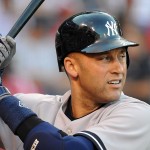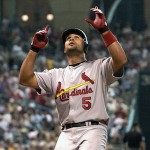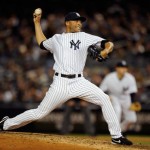The wonderful, and terrible, about the Baseball Hall of Fame is that it inspires instant debate and conjecture about the relative worthiness of present-day players for consideration. All it takes is ten seasons of play to be eligible for the ballot, though you do have to be nominated by two members of the committee in order to receive such a distinction. As we’ve seen with the current edition of the ballot, this is more often than not the hardest honor to receive (Rondell White, you guys!). I would like to make a note that it is, in fact, a great honor just to be on the ballot, and means that you must have done something of note during your ten years in the leagues.
The problem with projecting players into Hall of Fame consideration is that a great deal of it is based upon forecasting statistics, which necessarily requires throwing several tangible and intangible factors out of the window. A player might get horribly injured, losing his fastball; a player might prematurely age, losing his ability to catch up to a fastball; Albert Pujols might get traded to the Rockies, leading to a gabillionty more home runs than he would have otherwise hit.*
*Can we talk about how some factors in baseball have been somewhat smoothed out over time? Coors Field’s high altitude and conditions led to the gentrification of otherwise ordinary players like Dante Bichette and Andres “Big Cat” Galarraga back in the 1990’s, but the Mike Hampton misfire finally prompted them to use their infamous Humidor to store baseballs for games. (The Humidor keeps the balls in a more – well, humid – environment, making them less susceptible to flying through the air. This is kind of like saying smoking menthols reduces the amount of carcinogens you’re taking in every time you smoke a pack a day.
This exercise is based more in fun than it is in anything truly factual, although there are a few all-but-certain cases for the Hall of Fame at this point in time. The following players are people that I think will either merit a strong case for inclusion in the Hall or at least inspire a strong debate over their candidacy once they finally retire. I’ve included the following players based on their accomplishments to this point in their career, as well as their projections to either build their cases or shortly decline and retire. I’ve based my standards on the following criteria:
1) Must have played at least five seasons. (Enough time to build up a sizeable sample size to draw from)
2) Must be signed for the upcoming season to a major league team. (With one waffling exception)
3) Must have played in the major leagues for the last season. (Minor league rehab stints aside)
Statistics and hardware play a factor, but are not a basic requirement, though they do help in some cases.
While considering the following players, it must be admitted that some players have built stronger cases than others for inclusion at this point in time. Because of this, I’ve divided them into further categories (which I’ve titled based upon Hall of Fame voting:
The 75% – First ballot candidates; the elite of the elite.
The 50% – Going on the ballot, most likely going in, but not right away.
The 25% – Will be on the ballot for a good length of time, might build up candidacy, or they might go the way of Dale Murphy.
One and Done – 25% or less, possibly going off after their first ballot.
Before I get started, I’d like to toss out apologies for leaving any player off; I’ve looked over every major league team and have picked those I feel most likely to inspire future controversies and enraged debates about the Hall of Fame, and this will inevitably leave several players out. My sincerest hope is that I’ve made sure to not make any egregious oversights; and remember, this is all in fun. J
THE 75%
Catchphrase: “Duh”
Derek Jeter – He’s got the stats, he’s got rings covering one hand, and after a mini-slump in 2011, he rebounded to hit .316/.362/.429 with 15 home runs. He’s not slowing down and looks to be adding to his 3,304 hits in years to come. And he’s in the discussion anytime people start talking about the Top Five Yankees of All Time, which is no small thing. I think rumors of a run at Pete Rose’s all time total are ill-founded (he’s still 900 hits short), but he’s one of the few who should be drafting his Cooperstown acceptance speech.
Albert Pujols – If anyone has a shot at breaking Barry Bonds’ home run mark, it’s this guy. He’s started to slump in recent years, but in his first twelve seasons, he’s run up a WAR of 88.5. Which trumps your average Hall of Famer by a margin of 15-20. And now he has Josh Hamilton hitting behind him, after a year of adjusting to major league pitching. Currently sitting at 2,246 hits, 475 home runs, and 1,434 RBI’s, he’ll most likely hit 500 next year, and 3,000 hits and 2,000 RBI’s in six to seven years. Assuming his robotic control systems don’t rust.
Mariano Rivera – He could retire tomorrow and join Chipper and Jim Thome on the Hall of Fame ballot in five years and make it a hell of a strong class. The thing is, he can still pitch, and pitch better than most pitchers making a living in baseball today. The books have closed on his status as the Greatest Relief Pitcher of All Time, which somewhat precludes Hall of Fame status. 608 saves lifetime (a record) and counting.
Ichiro Suzuki – There are some who would argue this; to them, I say thee nay! He didn’t join MLB until he was 28, where he promptly picked up right where he left off in Japan. When you look at his stats, they’re almost video game like: 200+ hits in his first ten seasons of MLB baseball. Lifetime .322 average, 2,606 hits and counting (3,000 is entirely possible for him, in 2/3 of the time it would take a normal human to collect that many.) Most hits in a single season (262!). The knock against him is that he never hit for power, which is kind of a bum rap, given that he batted leadoff for much of his time with the Mariners, scoring 1,200 runs in what has been a mostly putrid Seattle offense for the majority of his career. If his late season numbers at Yankee Stadium were no fluke, he could reach 3,000 hits by the end of the next three years.
THE 50%
Catchphrase: “You’re the best…around!”
Roy Halladay – Doc Halladay, for much of the 2000’s, was the greatest pitcher in baseball. Which is unfortunate, since for most of it, he had to play for the Toronto Blue Jays, out of sight and out of mind. His 2010 season for the Phillies (21-10, 2.44 ERA, 9 complete games, 4 shutouts, 1 perfect game, 1 no-hitter in the postseason) was extraordinary, and while he tapered off last year, I think his peak is enough to include him in the Hall of Fame if he has two or three more good years. Lifetime 63.1 WAR.
Joe Mauer – He strikes me as a modern version of Mickey Cochrane, the great hitting Hall of Fame catcher. He’s still quite young and very susceptible to injury, yet has already won three batting titles. (Those alone, as another famous Minnesota Twin named Tony Oliva, are not precursors to Hall of Fame election.) If he can hold up and keep playing at his current rate for at least another five years (a longshot if he doesn’t make the move to first before his knees give out), he’s got a shot.
Alex Rodriguez – In any other universe (or if this was the NFL), he’d be an auto-lock. However, what hangs over A-Rod is the steroid question. That, and the man has spent his career trying to find out ways to make himself the most unlikeable human being on the planet. His body is starting to give out on him, which is unfortunate in that he could have had all-time records in nearly any category he wanted, and fortunate in that we don’t have to celebrate another tainted record. I think if Bonds and Clemens make it in, A-Rod will get in, but I don’t see it happening on the first ballot.
CC Sabathia – Gosh, but there’s too many Yankees (current and former) on this list for my tastes. CC has one Cy Young to his credit, and had he played a few weeks more for Milwaukee in 2008 would have two. He’s won a ring with the Yankees, upon whom he’s been the de facto ace for four years now. He’s durable, if slightly on the pudgy side, so he should be able to last another five good years. More to the point, he’s only 32/33 and has already won 191 games. He’ll top 200 next year, and is my choice to be the next pitcher to win 300 games. Until he does, he’s only in the debate for the Hall of Fame, but of these candidates, he’s the most likely to rise to a near-lock.
Andy Pettitte – Another case of steroid use, although I feel like he’ll get credit for admitting to his mistakes and for not being a completely unlikeable douchebag. More to the point against Andy, while he’s won 245 games, his peripherals are fairly pedestrian when taken into full account (3.86 lifetime ERA, 54.5 lifetime WAR). He’s never won a Cy Young, though he did finish 2nd in voting in 1996. His best seasons came in 1997 and 2005, and for most of his career has been the 2nd or 3rd (or even 4th) best starter on his pitching staff. I think there’s a discussion about him, but I don’t think he deserves it in the same way that Mike Mussina should be up for discussion. (Pettitte is a big beneficiary of the Vizquel Effect, as we’ve seen by his continually coming back to pitch for the Yankees.)
THE 25%
Catchphrase: “Movin’ on Up: The Jeffersons of MLB”
Adrian Beltre – He’s now the best hitter in Texas, and has played Gold Glove caliber defense his entire life. Can put his team on his back for long periods of time. Suffered from taking several years to figure it out in Dodger Stadium before having one of the best contract years ever; promptly signed for the Mariners to play where hitters go to die. Resurged in recent years, with a chance to build a strong case for eventual inclusion. (The Hall seems to have a shortage of 3rd basemen, with the standards being remarkably high for inclusion. Chipper will increase that total, and I think both Beltre and Rolen will expand the conversation about what constitutes a Hall of Famer at the Hot Corner.)
Mark Buehrle – He’s good…but not Hall of Fame good. His career numbers are decent, though like Pettitte, he’s never been the ace on his staff. By the time he’s retired, his numbers will promote discussion, but I think he’s closer to a Jim Kaat than anything else. Which is sad, because he’s a marvel of consistency, and as close to a sure thing as you can find in MLB.
Miguel Cabrera – He’s on this list because he’s just now hitting his prime, seizing the title as the best hitter in baseball, though he’ll soon cede it away. The top five hitters that he compares most to through his age-29 season (last year) are in order, as follows: Frank Robinson, Henry Aaron, Ken Griffey Jr., Albert Pujols, Mel Ott. By the time he’s 31, he’ll move into the 50% group. By the time he’s 35, he’ll probably be in the ranks of first balloters. I’d put him there now if his WAR were higher (only 44.4 at this time, though remember, he’s just hit the 10-year mark). If he retired today, he’d make it in eventually. Another five years and he’s in guaranteed.
Todd Helton – His prime was incredible. Then he fell off a cliff. Last year, his WAR was -0.1. His lifetime stats are decent, though not as spectacular as I imagine the Rockies thought they would be when they signed him to that giant extension following his mammoth 2000 campaign. His numbers, to this point, actually reflect more poorly than Larry Walker, which I think helps Walker’s campaign but hurts Helton. Which is sad, because Helton’s one of the good guys of the league. Just not Hall of Fame material.
Felix Hernandez – Now, this guy is good. He’s only 26, already has nearly 1,500 strikeouts, and has a career record of 98-76. Which seems poor until you remember that he’s been the ace of his staff since he was roughly 23 years old on a historically poor hitting team. He’s already won a Cy Young, and should have won two. If/when he signs/is traded to the Yankees, he might win 30 games. Yikes.
Tim Hudson – He’s the only pitcher from that fantastic A’s team of the early 2000’s (you know, the Moneyball team) that’s not completely fallen apart (Mulder, Mark) or lost effectiveness to the point of inefficiency (Zito, Barry). A lifetime WAR of 51.1 is low, and he’s more along the lines of a Kevin Brown or a David Cone. If he has another two good years, he might help his case, but he’s 36 and only threw 179 innings last year. I think the debate is leaning towards not. Somewhere, Billy Beane is crying and smashing chairs.
Paul Konerko – Paulie was one of the heroes of that 2005 squad that broke Chicago’s streak of baseball irrelevance, and has stayed strong in his later years. He didn’t have his first truly great season until he was 28, and even that was lacking in terms of WAR. His lifetime WAR, in fact, is 25.3, hindered by his bouncing around in his early years before settling in at U.S. Cellular. He compares to Jason Giambi and to the next hitter in discussion, but even if he reaches 450 home runs, that’s too few for Paulie. As I’ve said before, it’s not the Hall of Very Good.
David Ortiz – I think, given Big Papi’s recent years, that when Ortiz comes up for discussion, the voters will have an interesting situation on their hands. On one hand, he’s been leaked as having been a PED-user prior to the crackdown on testing. On the other hand, he was a big part in the breaking of the Curse of the Bambino. On one hand, he’s played most of his career at DH, is essentially useless as a fielding 1st baseman, and compares most strongly to Carlos Delgado. On the other hand, he’s one of the best hitting DH’s ever, was absolutely devastating in his prime, and was robbed of an MVP in 2005 (if A-Rod wasn’t a Yankee, he wouldn’t have won). I’ll admit, Papi is just too damn likeable for me to not include on this list; I think his voting totals will be similar to Dave Parker, barring a run at 500 home runs. As I’ll discuss below, however, 500 might not be as much of a magic number by that point.
Scott Rolen – My one exception to the rule that a player must be signed for the next calendar year. (He’s dragging his feet on returning/not returning to the Reds or retiring. I think he comes back as a bench player next year, hence his inclusion here.) He does have a lifetime WAR of 66.6 (How’s that for foreboding?) and 8 Gold Gloves, as well as a reputation as one of the best defenders at the hot corner since Brooks Robinson. Statistically, his numbers are below those of players such as Adrian Beltre, but in his peak, Rolen was one of the driving offensive forces of the St. Louis Cardinals in their run during the mid-2000’s. Injuries lessened his impact, but as recently as 2010, he was able to provide leadership and a strong bat for the Reds. If he retires, I think he gets in after a few ballots. Assuming he retires this year. Which he might/might not.
Johan Santana – His prime from 2004 to 2008 was absurd. He won 2 Cy Youngs (and should have won 3), before injuring his shoulder so horribly that for a while it seemed as if his entire career was in jeopardy. The unfortunate truth is that his injuries have all but guaranteed that he won’t make the Hall of Fame. His lifetime WAR of 48.6 is strong, but the average pitcher’s WAR is 67.9. Another three seasons in his peak and he would be no doubt. His comeback year in 2012 was good, but again curtailed by injury. Sadly, all that we have is that glimpse of greatness, and we are left to think of what might have been.
Justin Verlander – He’s just entered his prime, and should be pitching like a stud for several years to come. His totals are low at the moment, but he’s already got 2 Cy Young awards to his credit and may add to that total. It’s early yet for Verlander, but everything seems to be pointing towards continued excellence.
Michael Young – Now, wait a minute. His hit totals are impressive, and though he declined last year, I think that he needed a change of scenery more than anything else. He compares favorably to Hall of Famers such as Barry Larkin and Ryne Sandberg (though his most apt comparison is Ray Durham). I don’t think reaching 3,000 hits is out of the question for Young (he’s only 770 short, or four or five good years in other words) even if he turns 36 next year. His defense is best comparable to a leaky sieve, he could very well drop off a cliff in performance in Philadelphia, and his lifetime WAR are…well, lacking. (22.1 lifetime) Check back next year.
ONE AND DONE
Catchphrase: “You like me! You really like me!”
Josh Beckett – Postseason hero of 2003 and 2007 for two separate teams. All of that aside, he’s been injured far too much of his career to prompt serious discussion. On the bright side, if there was a Hall of Douche, he’d be a first ballot.
Bartolo Colon – Aaron Sele Jr.
Adam Dunn – One of the good things about the devaluation of 500 home runs is that by the time Dunn reaches it (and he will, just you wait and see), no one will think twice about it. Good for Dunn, whose moonshots are absolutely incredible to watch life. However, he’s got a reputation as the second coming of Dave Kingman, and Kingman was not a Hall of Famer. Neither is Dunn.
Zach Grienke – He’s a good pitcher, but he’s only had one truly great year. He’ll win a lot of games with that lineup in Anaheim, but at the end of the day, he’s another Andy Pettitte. We’ll see.
Josh Hamilton – The thing about Hamilton is that he’s had such a short career and is entering what one might think of as his prime, but is in fact his declining years. He’s on this list more as a token appreciation than anything else, but he has put up good numbers when healthy. There’s so many factors that go into why his career is where it is (the drug use, the injuries, the addiction), but the storyline above all else is wonderful. With that being said, his career numbers will most likely wind up lacking unless he absolutely destroys the ball over the next five years. If he does, we’ll have to reexamine Mr. Hamilton once again.
Ryan Howard – 2006 seems so long ago.
Jimmy Rollins – 2007 seems so long ago.
Joey Votto – Come on, let me have my fun.
In case you’ve forgotten what we’re talking about, click here for Part One.
If short term memory is your problem, click here for Part Two.
If you want to see a cat singing the theme song to “Game of Thrones”, click here.










